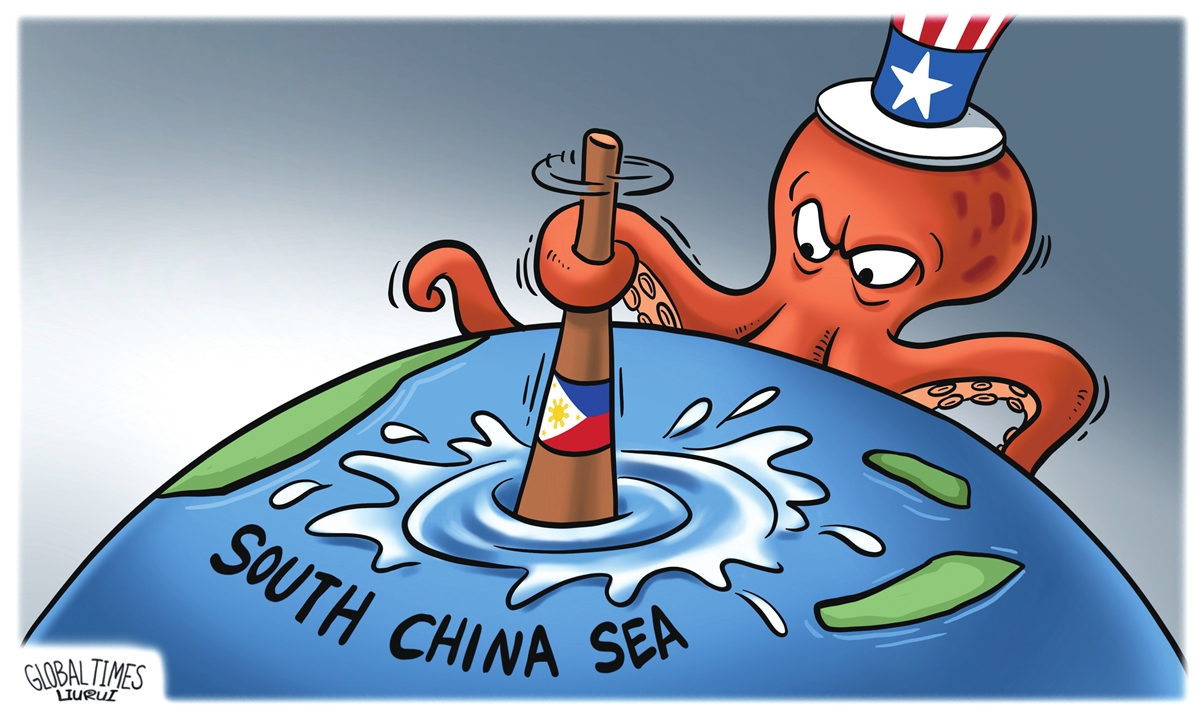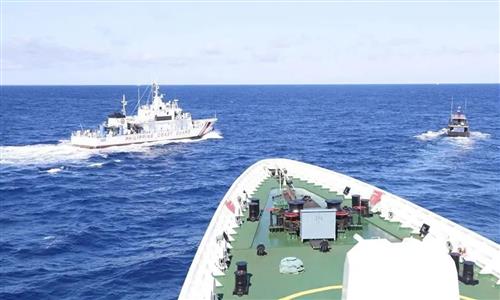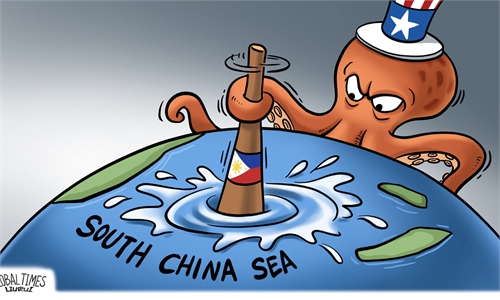
Stirring up trouble. Illustration: Liu Rui/GT
Amid the ongoing tensions around the Ren'ai Reef, the Philippine National Security Policy (NSP) 2023-2028 was published on Tuesday, in which the Philippines sees the potential conflict over the Taiwan question as a "major concern."Philippine President Ferdinand Romualdez Marcos Jr. said in April that "the Taiwan question is China's internal affair, and the Philippines will continue to strictly abide by the one-China policy as it has always done." Why does Philippines choose to break the consensus between the two sides over the years to maintain stability and peace on the Taiwan question?
The NSP document mentioned that "any military conflict in the Taiwan Strait would inevitably affect the Philippines given the geographic proximity of Taiwan to the Philippine archipelago and the presence of over 150,000 Filipinos in Taiwan." This claim does not hold water at all. If the Philippine government is genuinely concerned about the safety of Filipinos on the Taiwan island, shouldn't it focus on stabilizing the situation in the Taiwan Straits instead of exacerbating tensions?
"This NSP is in fact a reflection of the Philippine government's posture and policy. It reflects Marcos Jr. administration's tendency to cater to US' stance," said Tang Qifang, an associate research fellow at Department for International and Strategic Studies, China Institute of International Studies. She added that the Philippine government wants to show its allegiance to the US in its actions, and it could be said that the Philippines has half stepped into the trap of US-led camp confrontation, not far from turning against China on matters concerning China's core interests.
Earlier this year, the Philippines opened four additional military bases near Taiwan and the South China Sea to the US under the Enhanced Defense Cooperation Agreement (EDCA). The Philippines' move has aroused discontent among its own people and other ASEAN countries, which show the Philippine government misjudged the current situation.
"The NSP released by the Philippines at this moment is undoubtedly an endorsement of the Indo-Pacific strategy of the US, to further consolidate the so-called alliance and cooperation between the two countries," Xu Liping, director of the Center for Southeast Asian Studies at the Chinese Academy of Social Sciences, told the Global Times. By hyping conflict over Taiwan as a "major concern," Manila, in fact, is really intended to move closer to the US to seek more US support for the Philippines in the South China Sea, Xu noted.
This has seriously hampered and retrogressed China-Philippines relations, and is not in line with the independent foreign policy of the Philippines. Be it unilateral acts of sabotage and provocation by the Philippines on the Ren'ai Reef or on the Taiwan question, this may probably lead to consequences that the Philippines itself can't bear. It not only jeopardizes China-Philippine relations, but may also affect the peace and stability of the entire Southeast Asian region and even the world at large, as well as cripple ASEAN unity by sowing discord among ASEAN countries.
Historical experience has proven that meeting China halfway on the Taiwan question and South China Sea issue could benefit the Philippines the most.
As the Philippines has been escalating tensions in the South China Sea, it should be reminded that the one-China principle is the bottom line. Once this bottom line is broken, the interests of the Philippines will be greatly undermined. Thus, the Philippines should be careful, not to touch this red line with China. Its room for action in the South China Sea and the Taiwan question is limited. China and the Philippines can only resolve their differences through amicable consultation, rather than exacerbating conflicts through treble-tongued diplomacy.
The Philippine government should remain rational and objective on the issues related to the Taiwan Straits and the South China Sea, and not be influenced by the Cold War mentality of certain external powers, so as to avoid becoming their cannon fodder. Otherwise, it will only lead to more losses than gains for the Philippines. True balance is maintaining a neutral and friendly relationship with all countries, rather than seeking self-righteous balance through capriciousness and backtracking.


